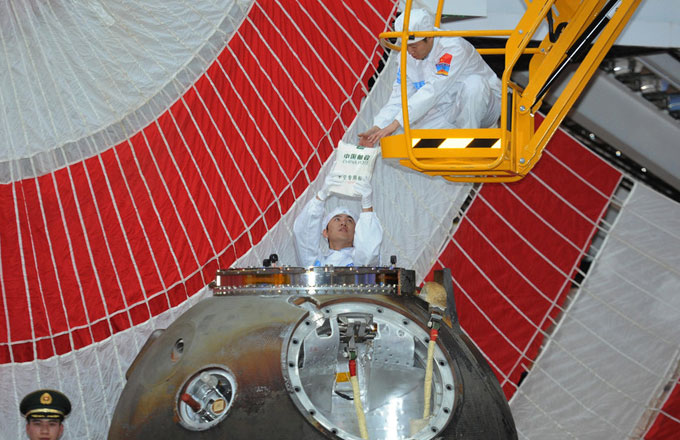S. Korea plays up pop culture to attract Chinese
As South Korean reality shows, dramas and pop music sweep Chinese television screens, tourism officials and agencies are looking to further tap their commercial potential.
China replaced Japan as the largest source of tourists to South Korea in 2013, with a record high of 4.32 million trips made by Chinese people, accounting for 35.5 percent of the country's inbound tourism market.
Among the most popular destinations of Chinese tourists is a display of theatrical sets used in the television series My Love from the Star at the neon-studded Dongdaemun Design Plaza.
As the TV series became wildly popular in China, a drama center in the plaza featuring the TV series welcomed 1,000 visitors daily, 90 percent of which were from China.
Choi Yong-hoon, a manager with the Tourism Policy Division, an authority under Seoul's metropolitan government, said he sees much bigger potential in tourism from China.
"It is one of South Korea's closest neighboring countries. It is natural that the two countries boost strong tourism relationships," he said.
As part of an effort to increase the number of tourists from China, Choi said the authority has implemented a program certifying quality tourism products in Seoul to further improve the tourist experience.
"Our primary purpose is to increase the number of returning tourists. If tourists are content with the experience we offer in their first trip, they will come back with their family or friends," he said.
The Seoul authority is also keenly aware of the role Korean pop culture could play in attracting more Chinese tourists. It has already hosted showcase events in China, including in Beijing and Guangzhou, to promote package tours, including those that offer a pop culture experience.
Choi said the authority is also concerned about the large number of low-quality travel packages in the market, most of which force tourists to purchase products at designated shops to make up for discounted prices.
"Such tourism products not only reduce the satisfaction index among the tourists, they also damage the image of the country," he said.
The metropolitan government has so far certified 10 tour packages targeting Chinese tourists and setting strict standards for accommodations, restaurants, cultural experiences and tour guides.
A survey conducted by the Seoul Tourism Organization shows that an overwhelming percentage of Chinese tourists are young women interested in shopping or face-lifts.
"We want to attract the young women because they have proven shopping capacity," said Ko Wui-sung, chief of the tourism marketing team with the organization.
Ko said the organization will encourage tourist agencies to showcase the city through all five human senses through the certification system.
The purchasing power of Chinese tourists has already impressed Kim Jong-hyeok, a senior manager with the Future Business Development Group. The group now operates Klive, a K-pop hologram performance hall in Seoul, which recreates the experience of live performances for visitors using digital technologies.
Kim said the group is already making efforts to introduce more performance artists that are popular in China in a bid to attract Chinese tourists.
"Chinese tourists have always been our primary target audiences. We are also considering expanding our business to China to better connect with them," he said.
According to the Seoul Tourism Organization, the most popular shopping destinations for Chinese tourists are ginseng shops, cosmetics stores and health food outlets. They also take the greatest share in the duty-free category and in the trendy shopping districts of Dongdaemun and Myeongdong.
Zhang Jia, a travel project manager with the Shanghai Moisson Media Advertising Co, which offers travel guides from different countries, said that of China's neighboring countries, South Korea was the one that makes the most vigorous effort to attract Chinese tourists.
"Their efforts can be felt in the Chinese language bulletins and guideboards, and in the Chinese-speaking shop assistants everywhere.
"They know how big the market can be and how willing to spend the visitors are. And they are eager to take advantage of that," she said.
Contact?the writer at xuwei@chinadaily.com.cn

























